





|
Hasiera · Home |
|
Ezaugarriak · Features |
|
Oharrak · Notes |
|
Sarrera · Introduction |
|
Euskara |
|
Folklore |
|
Kirolak · Sports |
|
Musika · Music |
|
Janedanak · Gastronomy |
|
Tokiak · Places |
|
Historia · History |
|
Politika · Politics |
|
Diaspora |
|
Internet |
|
Albisteak · News |
|
Nahas Mahas · Misc |

For security reasons, user contributed notes have been disabled.
by David Cox
| David Cox is employed as a writer and editor and lives in Ontario, Canada. David also contributes review articles to the U.S -based internet publications rambles.net and rootsworld.com, where he writes about European world-roots music, specializing in the music of Euskal Herria and Cymru-Wales. His hobbies include studying the Basque and Welsh languages and playing Euskopoli with his children. |
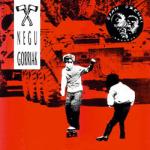 December 1990, in the heart of the Spanish meseta, a prison called Herrera
de la Mancha where hundreds of Basques are held. A massive cordon of
military and police on horseback are on patrol nearby. Dozens of buses
arrive in the rain. The Basque national flag, the ikurriña, is everywhere.
The sound of the txalaparta, a haunting percussion instrument, echoes.
Banners appear and pictures of Basque prisoners are displayed. The alboka,
an ancient horn, is heard. A bertsolari sings in Euskera, the ancient
language of the Basques.
December 1990, in the heart of the Spanish meseta, a prison called Herrera
de la Mancha where hundreds of Basques are held. A massive cordon of
military and police on horseback are on patrol nearby. Dozens of buses
arrive in the rain. The Basque national flag, the ikurriña, is everywhere.
The sound of the txalaparta, a haunting percussion instrument, echoes.
Banners appear and pictures of Basque prisoners are displayed. The alboka,
an ancient horn, is heard. A bertsolari sings in Euskera, the ancient
language of the Basques.
A stage is built and a number of young Basque men in hip-hop attire take their places. "Hey - Euskalduna naiz eta harro nago!" shouts the band leader echoing James Brown -- “Hey – I’ll say it out loud – I’m Basque and I’m proud!” A band called Negu Gorriak launches into a series of bold power chords. Leader Fermin Muguruza sings out a challenge to the soldiers and the helicopters nearby, and assurance and defiance to the assembled flag-waving crowd and the Basque prisoners waving the ikurrina out tiny windows in the distance.
Negu Gorriak continue a set including "Oker Dabiltza" (Wrong Way), an instrumental rocker dedicated to Josu Muguruza, the Basque politician assassinated in 1989; "Bertso-hop," an unusual melding of Basque bertsolaritsa and heavy rock, about a man who comes home drunk and gets into bed with his grandmother instead of his wife by mistake; the punk anthem Napartheid; and a punk-rock Basque Christmas song "Hator, Hator" (lyrics: come, come, boy, home).
Here they also played "Amodiozko Kanta" an energized rocker about lovers separated by distance and prison; “I love you when I have coffee and cream – in a town that’s not mine – I love you when I see grey walls and they give me a number – I love the 55 minutes that the visit lasts.” Fifteen years later the words still summarize the feelings of many Basques.
Who or what was Negu Gorriak? As one Basque commentator notes on this site, Basque music has two extremes, folk and heavy rock, and not a lot in the middle. While clearly rock, they incorporate many Basque elements, doing what Oskorri’s Natxo Felipe once thought was impossible: to play rock and roll and stay Basque. Drawing from a wide variety of rock influences, this group also stamped a huge Basque lauburu on its music.
Decolonization movements
Basque industrial towns -- like Muguruza’s home town of Irun, Gipuzkoa -- gave birth to a number of rock groups including the now-legendary Negu Gorriak, a gritty, heavy rock band that quoted from Brecht, Atxaga and Spike Lee.
This was the post-transition generation, the first generation to learn Euskara in school, the generation that grew up disillusioned by unemployment and the lack of real progress on their issues. If the Spanish and French states were democracies, why were young Basques still facing such an uncertain future?
Vocalist Fermin Muguruza, his brother Iñigo and Kaki Arkarazo (both on guitar) formed the core of the band after disbanding the group Kortatu. Later the two Mikels, Abrego and Kazalis, better known as Bap (drums) and Anestesia (bass), joined full-time. Six years in, with eight influential recordings and on the verge of international fame, NG voluntarily split up – vowing, according to one story, not to reform until the seven provinces are united and independent.
Muguruza, who once struggled to learn Euskara as an adult, ties the Basque people’s struggle for their language and respect into international movements for decolonization. He looks for inspiration to the oppressed peoples of the world, in a kind of global musical reconstruction of the international brigades and alliances of the 1930s. NG stress the importance of speaking out against injustice (Hitz Egin), international solidarity with oppressed peoples, questioning what we read in the media, and a pride in being Basque (Esan Ozenki). They challenge stereotypes and racism (Kolore Bizia). They pay homage to the worldwide pioneers of music, politics, and film, while sharply criticizing injustice and corruption both at home and abroad.
There is no give in this music, no ambiguity and the emotional range is fairly narrow. Muguruza doesn’t do ballads. This is the soundtrack of a society in conflict. Songs are short, sharp and pointed; full of power chords and guitar licks and samples, from reggae, rap, hip-hop, heavy 70s rock, soul, and a range of other sources.
Negu Gorriak (harsh or red winters) takes its name from a Brecht poem, “Gaberako Aterbea” (Night Shelter) a song on their first, self-titled album. On this record, NG also pays tribute to black urban music and the films of Spike Lee with the song “Radio Rahim” and its call to do the right thing (Egin ezazu behar duzuna). Another vital spark came from Jamaican post-reggae with "Ragamuffin Jaia" where the pirate flag is raised in the Skatu tavern.
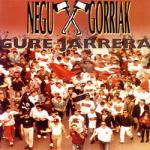 With Anestesia and Bap now on board, the second album, Gure Jarrera (Our
struggle) - written in collaboration with the bertsolari Jon Maia - evokes a
dark vision of the Basque country (“Lehenbiziko Bala”);and evokes parallels
from the colonial Sepoy rebellion in India against the English (“Zipaioen
Matxinada”). “Ustelkeria” (corruption) accuses a police officer of using
drug money to finance a death squad (leading to legal action against the
band).
With Anestesia and Bap now on board, the second album, Gure Jarrera (Our
struggle) - written in collaboration with the bertsolari Jon Maia - evokes a
dark vision of the Basque country (“Lehenbiziko Bala”);and evokes parallels
from the colonial Sepoy rebellion in India against the English (“Zipaioen
Matxinada”). “Ustelkeria” (corruption) accuses a police officer of using
drug money to finance a death squad (leading to legal action against the
band).
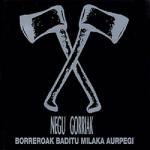 On the next major release, Borreroak baditu milaka aurpegi (The hangman has
a thousand faces), the band takes on a new direction with the lyrical help of
bard Jon Sarasua. The hangman in the title song could be anywhere: in
Gasteiz (the Basque capital) or Washington. In “JFK” the idea that
Kennedy-style liberalism was helpful for people like the Basques is
dismissed with irony: “I don’t remember what year the Kennedy clan was
fixing to free Euskadi.” “Kolore Bizia” is another call to solidarity:
“We’ll defend our brothers and sisters – don’t forget we’re afro-Basques.”
This acclaimed disc (Don Snowden called it “one of the best CDs released in
any language anywhere in the '90s -- fast and furious, loud and melodic,
smart and savage, and jarring and organic” ) attacks capitalism, and
invokes international solidarity.
On the next major release, Borreroak baditu milaka aurpegi (The hangman has
a thousand faces), the band takes on a new direction with the lyrical help of
bard Jon Sarasua. The hangman in the title song could be anywhere: in
Gasteiz (the Basque capital) or Washington. In “JFK” the idea that
Kennedy-style liberalism was helpful for people like the Basques is
dismissed with irony: “I don’t remember what year the Kennedy clan was
fixing to free Euskadi.” “Kolore Bizia” is another call to solidarity:
“We’ll defend our brothers and sisters – don’t forget we’re afro-Basques.”
This acclaimed disc (Don Snowden called it “one of the best CDs released in
any language anywhere in the '90s -- fast and furious, loud and melodic,
smart and savage, and jarring and organic” ) attacks capitalism, and
invokes international solidarity.
Spreading the word, and then goodbye
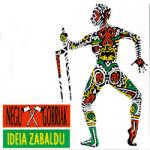 With this critical momentum, NG released Ideia Zabaldu (Spread the Word)
worldwide, speaking out against censorship (“Hitz Egin”), denouncing the
role of imperialism in creating international poverty (“Ume Hilak”), and, on
“Aizu,” looking at their own generation and its issues.
With this critical momentum, NG released Ideia Zabaldu (Spread the Word)
worldwide, speaking out against censorship (“Hitz Egin”), denouncing the
role of imperialism in creating international poverty (“Ume Hilak”), and, on
“Aizu,” looking at their own generation and its issues.
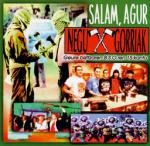 Salam Agur means goodbye, in Basque and Arabic. On their last disc, bearing
this title, the band says goodbye and pays tribute to a wide variety of
artists. These range from The Who “Can’t Explain” to Bob Marley “Lively up
Yourself” to Public Enemy and Otis Redding – Aretha Franklin’s “Respect”.
They also give us Clash’s Rebel Waltz and a Linton Kwezi Johnson’s number
called “Reggae Peachentzat.” All of this, of course, in Euskara, in NG’s
inimitable style.
Salam Agur means goodbye, in Basque and Arabic. On their last disc, bearing
this title, the band says goodbye and pays tribute to a wide variety of
artists. These range from The Who “Can’t Explain” to Bob Marley “Lively up
Yourself” to Public Enemy and Otis Redding – Aretha Franklin’s “Respect”.
They also give us Clash’s Rebel Waltz and a Linton Kwezi Johnson’s number
called “Reggae Peachentzat.” All of this, of course, in Euskara, in NG’s
inimitable style.
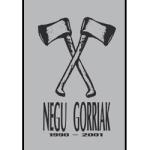 NG returned for a last short series of concerts in 2001. This was an
unrelenting set of music introduced by bertso Jon Maia. Negu Gorriak had moved
beyond its legal problems, (the allegations the band made in Ustelkeria
proved true) and the various members had gone on with their own projects.
This concert can be found on the recently released Negu Gorriak 1990-2001,
in both CD and DVD (which also includes the Herrera de la Mancha footage.)
NG returned for a last short series of concerts in 2001. This was an
unrelenting set of music introduced by bertso Jon Maia. Negu Gorriak had moved
beyond its legal problems, (the allegations the band made in Ustelkeria
proved true) and the various members had gone on with their own projects.
This concert can be found on the recently released Negu Gorriak 1990-2001,
in both CD and DVD (which also includes the Herrera de la Mancha footage.)
Since then, Fermin Muguruza, an endless reserve of on-stage energy and activism, has been involved in several new projects, including a recent CD, Euskal Herria Jamaika Clash - summarizing his major influences (Basque music, ska-reggae, The Clash). Meanwhile, Bap and Anestesia continue with their own rock bands of the same names.
NG stood out because they were not just a rock band, but a movement. They started their own record company (Esan Ozenki). They brought a creative, fresh approach that mixed disparate musical elements. They did this in the ancient, difficult-to-learn language of an often misunderstood people.
Like many Basque artists, Negu Gorriak and Muguruza have been subject to censorship due to their politics. Some of Muguruza’s concerts in Spain with Manu Chao were cancelled in 2004. As well as the "Ustelkaria" controversy, songs such as "Sarri Sarri" (a song from Kortatu, about the escape from prison of one of Euskadi’s most famous writers) are considered politically suspect by some in Spain. Richard Byrne in The Globalist reports that Muguruza, when once challenged by Spanish journalists on his politics, replied: “My only armament is music.”
Artists like Negu Gorriak and Muguruza are the progressive future of the Basques. While living their lives in Basque and expressing themselves in Basque through music, they are focused outward with a sound that achieved worldwide recognition, and continues to build links between the peoples.
NG Links
www.muguruzafm.com
www.musikazblai.com
http://en.wikipedia.org/wiki/Negu_Gorriak
http://www.esan-ozenki.com/
http://www.lafactoriadelritmo.com/fact4/negubye.shtml
http://www.angelfire.com/ga/negugorriak/
http://www.negugorriak.net/
http://www.musikametak.com/
http://www.radiochango.com/english/artists/artist.php?ID=357
http://www.theglobalist.com/DBWeb/StoryId.aspx?StoryId=3828
David Cox
|
Please report any problems or suggestions to Blas. Eskerrik asko! |





